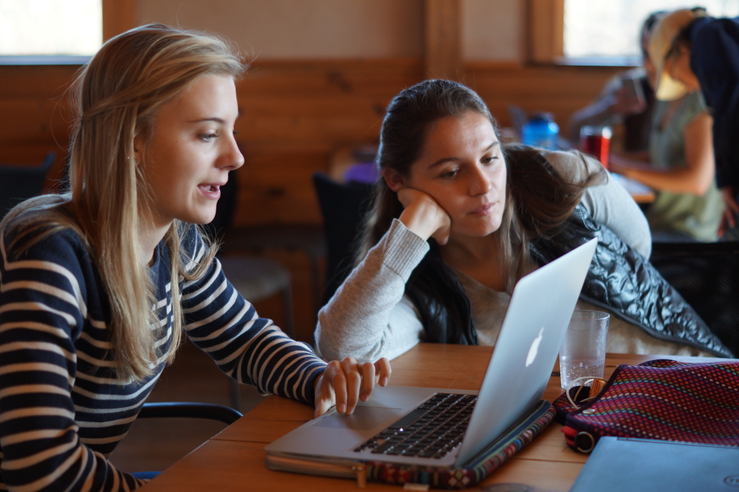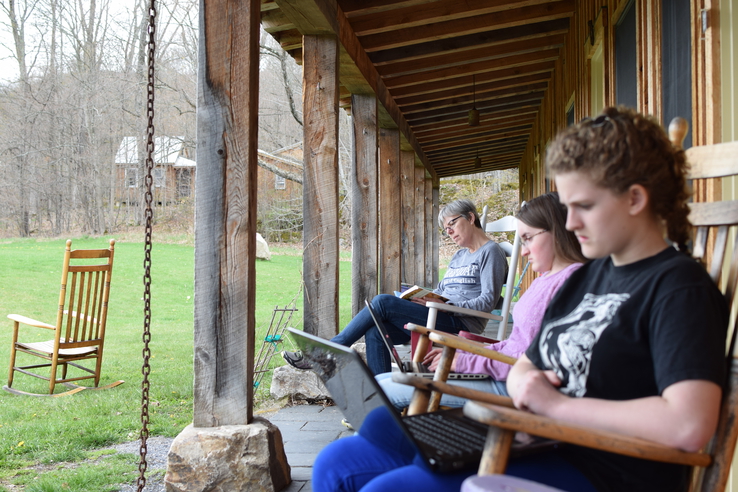
#3 Undocumented Immigrant Workers
I initially was going to research the issue of education in small schools. I then decided that I wouldn’t have enough resources of information and enough sides of the argument to really go into depth with the topic. I am now going to do undocumented immigrant workers in Vermont and how they impact our agriculture industry. I would like to interview dairy farmers, activists, people who are opposed to the idea of immigrants working in our fields, and hopefully some immigrants themselves. I am really excited about this topic and can’t wait to see how these illegal immigrants effect Vermont.
I interviewed three people, my dad, Tim, my mom, Rebecca, and my friend, Brooke Smith. I asked them three questions, “What do you know about the topic?”, “What is your opinion?”, and “What do you think needs to change?”. I got some similar responses and some that were slightly off.
When I asked “What do you know about the topic?”, Rebecca knew quite a lot about how the problem originated and what the current state of the situation is. When I asked what she knew about the life styles of these immigrant workers, she said, “I don’t know that much. I know that many of them send money home and don’t bring extended families or bring kids here because they can’t send them to school. I don’t think they can legally be in school.” She made it sound like they weren’t given the best possible situations. When I asked Tim the same question, he had a slightly different response. “They seemed to be treated fairly, they’re paid reasonable wages, as far as I understand, I don’t really know. Seems like they’re given housing and seems like even if they are undocumented they are trying to follow protocol of some other programs that I know do exist for documented workers.” He made it seem that they weren’t doing as bad as they could be. When I interviewed Brooke, she brought up a very big detail about the lives of immigrant workers. She said that because they aren’t citizens, they can’t drive a car, can’t get an education, and can’t get a real job other than farming because only the farmers are willing to turn a blind eye on these immigrants doing the work for them. This made we wonder how much is true between these two very big statements and partial beliefs and what was common theorizing.
After that, I asked, “What is your opinion?”. Tim said something along the lines of letting these immigrants come and be able to work and by letting them do that they should be able to become citizens and pay taxes, contribute to society and to their community, making it “more clear to everybody involved what role they’re really playing“. Rebecca said pretty much the same thing, including, “…if our education system continues in the way that it’s currently going, then young people in Vermont will continue to work for white collared jobs and not be willing to do manual labor, and if our economy is going to be dairy based then we need someone to do the work.” Brooke said that she didn’t think it was fair, kicking people out of our country that were willing to do the farm work we are not. She also said that we should find a solution because it isn’t fair to shove people back into their original country after living here for many years. I agree with all of these opinions and think that we really need to find a solution but I wonder how eager people are for the change of either having to deal with these immigrants and what is going to happen within the country if a significant change does come.
When I asked Brooke what should happen to make that change, she said, “I think that [the immigrants] need to become registered in our country. You know, there are children that are born here and grandchildren that are citizens of the U.S. and they can go anywhere and come right back because that’s legal in the U.S. because they were born here. I don’t think it’s fair to send their family members away. But I think to make the situation better they need to become registered in the U.S. legally because then they would be able to get a car, a job, and an education for their family and still do farming.” Rebecca said something very similar. She said that the government should give citizenship to the immigrants that have been working on the farms for a certain period of time to show that they have commitment to their community and then given the rights of their new citizenship like education, driving rights, and better housing. Tim also said the same thing, stating that they should be allowed into the system of our country and pay their fair share of taxes.
When I first thought of this topic, I had a discussion with my parents and they told me about the lack of education, money, housing, and the unfair treatment of being an undocumented immigrant worker. I thought that to change this we should create a system that makes becoming a citizen easier. After I interviewed these important people in my life, I realized that just changing that one thing wouldn’t make everything better. How would we control the flow of immigrants coming to our country? How do we make it so that only the people that are going to become good citizens are let in? How do we prevent terrorism from other countries if we just let everyone in with arms open wide? How will the citizens of this country react to this change? These are some of the broad questions I want to explore as I continue my research of undocumented immigrant workers in Vermont.
Featured image is by Nicholas A. Tonelli
Smith, Brooke. “Undocumented Immigrant Workers.” Telephone interview. 24 Sept. 2016.
Lindenmeyr, Tim. “Undocumented Immigrants.” Personal interview. 24 Sept. 2016.
Lindenmeyr, Rebecca. “Undocumented Immigrants.” Personal interview. 24 Sept. 2016.
 Previous Post
Previous Post






Hi Elsa!
I’m Clara. I appreciate the organized approach you took to this incredibly wide ranging and multi-faceted issue, and I think that you sum up many of the biggest questions surrounding it very well in the last paragraph. It is also a very timely issue, and I wonder whether the scope or direction of your work will change throughout the year depending on the results of the presidential election. I think that it might be interesting to take a closer look at why farmers in particular are willing to “turn a blind eye” when no one else is, as well as the relationships that develop between farmers and Mexican immigrant workers. I like that you included immigrants in your list of people to interview; I think that in an exploration of their situation getting their perspective will be essential and invaluable, though there may be some logistical problems.
Hey Elsa,
Wow, I really loved that write-up! As you may have already noticed, I am planning my project around Mexican migrants here in Vermont. Although there are some obvious differences between our projects, I think that they tie really well together and you mentioned some good points. I agree that migrants should be allowed to work here without living in paranoia of being sent back home. Furthermore, I agree that there are problems with allowing more immigrants into our country and not making them have the complete set of documentation. I think as you continue with your project it would be interesting to look into the different types of visas (I know in the United States there is one specifically for temporary agricultural workers) and see if a possible change for future immigrants could come from that section of the immigration policy.
Best of luck as you continue with this project!
Justin
Hi Elsa,
You’ve certainly done your research and are discovering, I hope, that good research leads to more good research, but not necessarily to definitive answers. The questions raised by your initial interviews are good ones. This is a complicated topic with many layers to peel back. Sometimes our initial thoughts get changed by the work that we do, and our initial opinions become mere memories. Isn’t it cool to document your thought process here on the blog? By the end of the year you will be able to look back and see how your initial thoughts and ideas change over time. This is the essence of real learning, and you’re off to a great start!
Hi Clara,
Thank you for commenting your thoughts! I agree that this is a very complex topic, which is why I’m so eager to explore it. I noticed your connection to the presidential election, but I don’t know if I will explore that relationship a ton. I think I would be biting off more than I could chew. I could be wrong, so I will keep it at the back of my mind. I most certainly will be looking into the reasons police and farmers ignore these immigrants’ legal status as I dive deeper into this topic. I realize the trouble of interviewing migrant workers themselves, but hopefully I will be able to find at least one or two sources throughout the course that will be willing to be interviewed.
Thanks, again, for commenting,
Elsa
Hi Justin,
Thank you for that first comment! I am excited to see how our two topics will compare and contrast as we continue to work throughout the year. I have heard of visas and write about something similar in blog post #4. I think an idea very much like visas will be a possible solution, maybe the best one, but I haven’t made any definite decisions, as to be expected.
Thank you for your thoughts,
Elsa